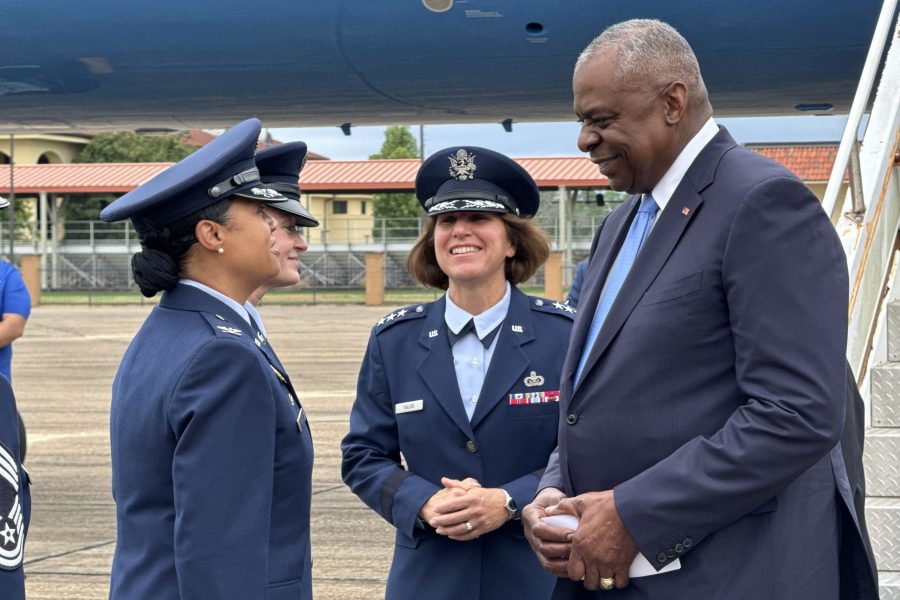MAXWELL AIR FORCE BASE, Ala.—Secretary of Defense Lloyd J. Austin III unveiled a series of new actions intended to improve living standards for U.S. troops and their families during a visit here on Sept. 13.
The initiatives include enabling military families to set aside income-tax-free funds for healthcare, get reimbursed for longer stays in temporary quarters during a permanent change of station move, and enhancing benefits for staffs at child development centers on military bases.
Austin and First Lady Jill Biden, who traveled separately to the Alabama base, highlighted the new universal pre-K at Department of Defense schools in the United States. That initiative will enable thousands of additional military children to attend DOD Education Activity (DODEA) schools over the next five years, the Pentagon said. Austin, his wife Charlene, and Biden visited with students at Maxwell’s elementary and middle school, with America’s senior defense official holding a paper dinosaur as toddlers conducted their lessons and later being serenaded with a song about counting frogs.
“We push pretty hard to ensure that we’re actually doing things to provide benefit to our troops and families,” Austin told reporters before boarding his C-32 back to Joint Base Andrews, Md. “I think we’ve added real value to our families and to our troops. And we’re not finished.”
The announcements add to Austin’s Taking Care of Our People initiative, which the retired Army general launched soon after returning to the Pentagon as its top civilian.
“Doing right by our all-volunteer joint force and their families is a core readiness issue,” Austin wrote in a memo to senior military leaders. “The department has made enormous progress, but we have more to do.”
The moves, which come amid a challenging period for military recruiting and retention, will be phased in over the next several months.
Beginning in March 2025, service members will be able to establish Health Care Flexible Spending Accounts, allowing them to set aside from their income up to $3,200 in pretax dollars to spend on healthcare costs such as copayments, eyeglasses, dental care, and other health-related expenses not covered by Tricare, such as over-the-counter medications. Many civilian employers offer flexible spending accounts, which require funds to be spent within a set period of time in a use-it-or-lose-it system. The system will work similarly to the way existing Dependent Care Flexible Spending Accounts do.
Changing the rules for Temporary Lodging Expense (TLE) to allow coverage up to 21 days—instead of 14—adds a week to help service members and their families’ complete moves between duty stations. The new rules will take effect “as soon as possible,” according to a DOD fact sheet.
Spouse employment also gets new attention, with expanded eligibility for financial assistance for spouses to pursue associate degrees, licenses, and certificates to enhance their ability to find and keep jobs. Beginning Oct. 1, financial assistance of up to $4,000 for spouses of junior enlisted members will be expanded to include all enlisted spouses.
“We are expanding eligibility for the My Career Advancement Account, which provides financial assistance to our military spouses—we’re expanding that now to the entire enlisted force and warrant officer corps,” a senior defense official said.
The Pentagon has also sought to make it easier for spouses to telework in government positions and has encouraged private-sector employers to do the same.
“This is so incredibly important as an economic driver for our families,” a senior defense official said of spouse employment. “Many of those families in the United States are dual income families.”
Access to childcare is often a hindrance to spouse employment, but the Pentagon said it is making strides in improving childcare availability.
“When it comes to childcare, the one thing I want to say is you cannot talk about economic security and career progression without talking about childcare,” a senior defense official said.
All military departments are now encouraged to follow the Department of the Air Force’s example to improve recruitment at military child development centers. The Air Force covers 100 percent of the cost of keeping a childcare worker’s first child in a CDC, and 25 percent of the second child; Austin wants all services to apply that formula.
“It’s still not a perfect world, so we’re going to continue to work on this because I know it’s important,” Austin told a couple of dozen Airmen gathered in a hanger shortly after arriving at the base.
Out-of-pocket costs are also under review. Austin ordered an examination of uniform items and allowances to ensure that the anticipated wear matches reality. And he’s asked for a study of the impact on service members from being stationed in remote and isolated locations, where healthcare, off-base housing, and quality schools can be hard to find.
Finally, a pilot program will test the feasibility of making free WiFi internet access more widely available to troops.
“The department has made enormous progress, but we have more to do,” Austin wrote of the new efforts. “I have met directly with junior service members and families, with our senior enlisted advisors, and with service leadership to explore further steps to enhance quality of life for our people.”

